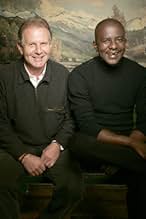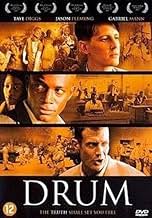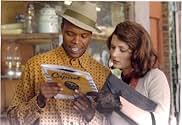Aggiungi una trama nella tua linguaA hot-shot journalist is swept up in a movement to challenge Apartheid in 1950s South Africa.A hot-shot journalist is swept up in a movement to challenge Apartheid in 1950s South Africa.A hot-shot journalist is swept up in a movement to challenge Apartheid in 1950s South Africa.
- Premi
- 2 vittorie e 1 candidatura in totale
Tumisho Masha
- Can Themba
- (as Tumisho K. Masha)
Zola
- Slim (Alpheus)
- (as Bonginkosi Dlamini)
Greg Melvill-Smith
- Major Att Spengler
- (as Greg Melville-Smith)
Lindani Nkosi
- Nelson Mandela
- (as Lindane Nkosi)
Tessa Jubber
- Carol Shand
- (as Tessa Jaye)
Israel Matseke-Zulu
- Vy
- (as Israel Makoe)
Trama
Recensione in evidenza
I saw this film at the 2004 Toronto International Film Festival. Drum is the story of Henry Nxumalo, a journalist for South Africa's pioneering Drum magazine. Set in the mid-1950s, the film attempts to recreate the ambiance of Sophiatown, an area of shops and nightclubs in central Johannesburg that has been compared to Harlem during its Renaissance. Henry is at first content to write sports stories for the magazine, until the gradual encroachment of apartheid laws threatens his beloved neighbourhood. Henry's politicization leads to confrontations with the authorities and to a predictable end.
Overall, I don't feel like I have much to complain about. It's just that, well, I think I expected more punch. I'm a veteran of many films and plays dealing with South African history, but most of them (Cry Freedom and the under-appreciated Barbara Hershey vehicle A World Apart, for instance) deal with the political awakening of white liberal South Africans, and have been directed by white, often foreign, directors. Even so, I found them powerful and inspiring. Naturally I expected that a film about a genuine black hero directed by a young black South African director would be even more powerful and affecting. And this one just wasn't. Clearly, the casting of American Taye Diggs in the role of Henry has a little bit to do with it. His casting tells me that the director wanted to make a commercial film, and with that comes some inevitable trade offs. The film feels too short and hurried to make Henry's transformation convincing. His relationships with his wife, boss, and colleagues were surely an integral part of the story, and yet they feel superficial here. At the Q&A after the film, Diggs even admits that he still feels the part should have gone to a South African actor. The director countered that "women dig Taye Diggs" and that his presence would "put bums in seats." Enough said about that.
The music, though, stands out and almost succeeds in elevating the film. Granted, it is pretty hard to mess up the music in a South African film, and here there is a fine mix of township jazz and mournful hymns that hints at what life in Sophiatown must have been like.
In summary, the film was competently written, directed, shot and acted. But it feels a little bit like a missed opportunity. Apart from the two films I mentioned above, you really should see the one-woman play The Syringa Tree (by Pamela Gien) if you ever get the chance. That play, performed by one woman on a nearly bare stage, has left indelible images in my mind that no film can ever match.
(7/10)
Overall, I don't feel like I have much to complain about. It's just that, well, I think I expected more punch. I'm a veteran of many films and plays dealing with South African history, but most of them (Cry Freedom and the under-appreciated Barbara Hershey vehicle A World Apart, for instance) deal with the political awakening of white liberal South Africans, and have been directed by white, often foreign, directors. Even so, I found them powerful and inspiring. Naturally I expected that a film about a genuine black hero directed by a young black South African director would be even more powerful and affecting. And this one just wasn't. Clearly, the casting of American Taye Diggs in the role of Henry has a little bit to do with it. His casting tells me that the director wanted to make a commercial film, and with that comes some inevitable trade offs. The film feels too short and hurried to make Henry's transformation convincing. His relationships with his wife, boss, and colleagues were surely an integral part of the story, and yet they feel superficial here. At the Q&A after the film, Diggs even admits that he still feels the part should have gone to a South African actor. The director countered that "women dig Taye Diggs" and that his presence would "put bums in seats." Enough said about that.
The music, though, stands out and almost succeeds in elevating the film. Granted, it is pretty hard to mess up the music in a South African film, and here there is a fine mix of township jazz and mournful hymns that hints at what life in Sophiatown must have been like.
In summary, the film was competently written, directed, shot and acted. But it feels a little bit like a missed opportunity. Apart from the two films I mentioned above, you really should see the one-woman play The Syringa Tree (by Pamela Gien) if you ever get the chance. That play, performed by one woman on a nearly bare stage, has left indelible images in my mind that no film can ever match.
(7/10)
I più visti
Accedi per valutare e creare un elenco di titoli salvati per ottenere consigli personalizzati
Dettagli
- Data di uscita
- Paesi di origine
- Lingue
- Celebre anche come
- Drum - Wahrheit um jeden Preis
- Luoghi delle riprese
- Aziende produttrici
- Vedi altri crediti dell’azienda su IMDbPro
Botteghino
- Budget
- 3.600 USD (previsto)
- Tempo di esecuzione1 ora 34 minuti
- Colore
- Mix di suoni
- Proporzioni
- 1.85 : 1
Contribuisci a questa pagina
Suggerisci una modifica o aggiungi i contenuti mancanti



















